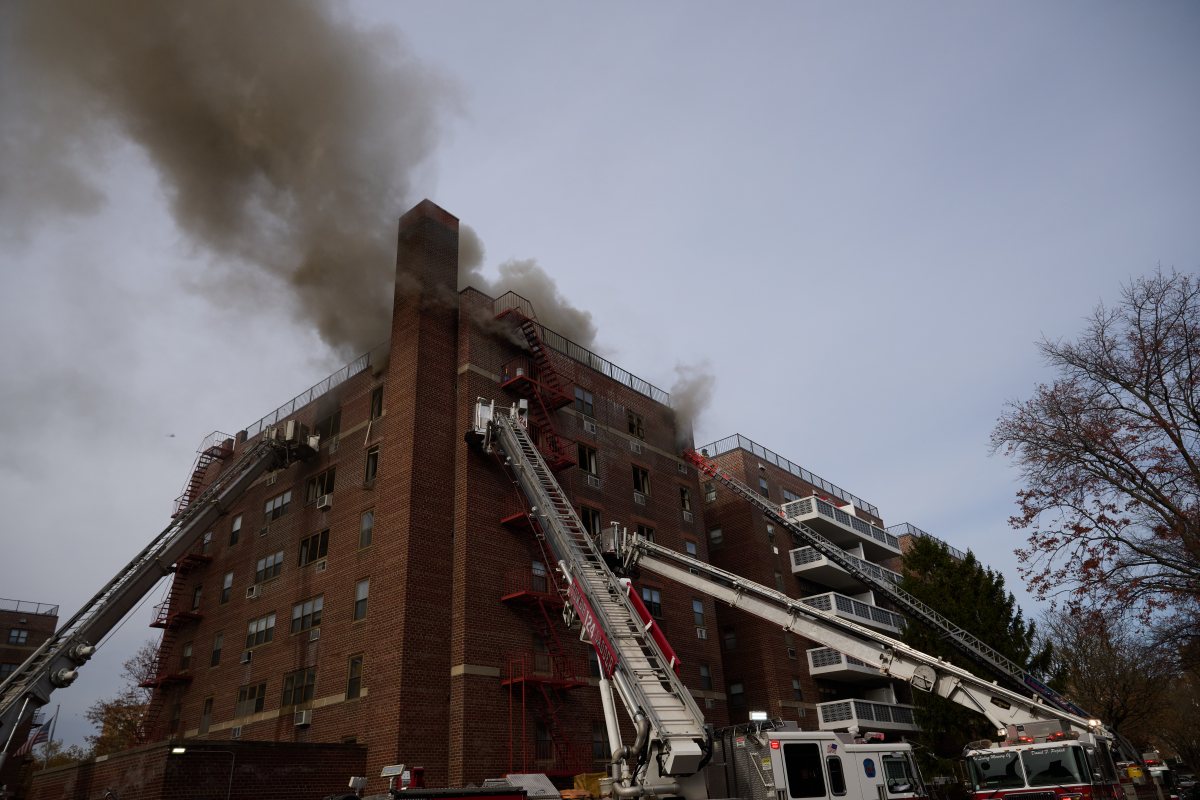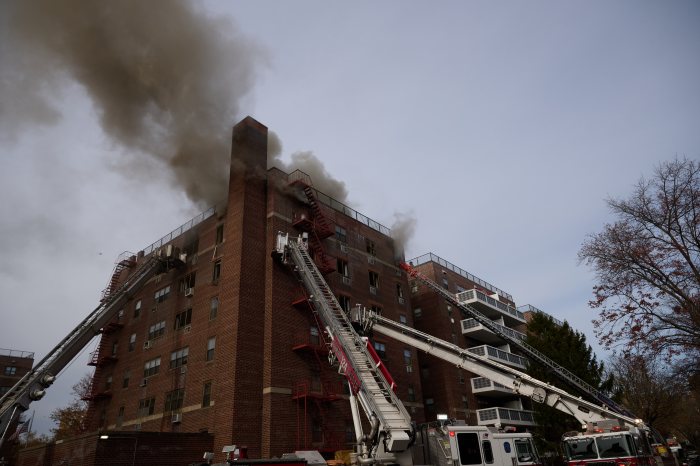By Aline Reynolds
A contentious anti-abortion billboard on a Soho building was taken down last Thursday after employees of the building’s ground-floor restaurant reportedly were harassed by protesters.
To many New Yorkers, the advertisement’s direct reference to African-American women was racially discriminatory.
The message read, “The most dangerous place for an African American is in the womb.” The text was accompanied by a portrait photo of an African-American child, supposed to represent the nearly 60 percent of black babies that died prenatally in 2009, according to a study conducted by the city’s Department of Health and Mental Hygiene.
The Radiance Found-ation, the Issues 4 Life Foundation and other anti-abortion organizations have posted similar provocative ads around the country, which have stirred heated debate in recent months, but not enough to warrant removal. According to Life Always, the Texas-based, anti-abortion organization that sponsored the ad, none of the other billboards were taken down prematurely.
The billboard’s opponents in New York City raised a big enough stink to have it dismantled last Thursday evening, only six days after it was put up. Chief among the them was Planned Parenthood, a family-planning clinic that, in 2009, provided about 47,000 New York City clients with birth control and abortion; reproductive health exams; and counseling, among other health services.
One of the group’s three New York City clinics is located in Noho, a 15-minute walk from the former site of the billboard, at 110 Sixth Ave. at Watts St.
“Planned Parenthood of New York City is very pleased that Lamar Advertising has heard the voices of thousands of New Yorkers and has decided to remove the offensive and reprehensible billboard,” said Roger Rathman, a Planned Parenthood spokesperson.
“The message of this specific poster,” Rathman continued, “was demeaning and stigmatizing to African-American women and the African-American community.”
Lamar Advertising Company, which installed the billboard, insists the decision to take it down had only to do with protesters’ reported harassment of servers at Lupe’s East L.A. Kitchen, a Mexican restaurant on the building’s ground floor.
Lamar claims it sought to protect the restaurant’s employees and diners from additional disturbance that could have resulted from a press conference scheduled for last Friday led by Reverend Al Sharpton.
Keeping the ad up in order to spread what Lamar deems an important pro-life message wasn’t worth the potentially harmful repercussions, according to Peter Costanza, vice president and general manager of Lamar’s New York-New Jersey operations.
“I don’t want to put anyone in jeopardy of violence in the neighborhood or restaurant,” said Costanza. “If I had known people were going to get harassed, I wouldn’t have put it up.”
Constanza said, in his six years on the job, this is the first case of ad-related harassment he’s aware of in New York or New Jersey.
The owner of Lupe’s East L.A. Kitchen, who declined to give his name, confirmed that protesters against the ad were bothering his staff, but wouldn’t comment on the nature of the alleged harassment.
The firestorm surrounding the billboard, he added, appeared to be one big publicity stunt.
“It was a billboard in bad taste, but why is it such a big deal?” he said. “Five news vans came here in two days. I’m tired of it. It’s just idiocy.”
Life Always and Lamar Advertising decided to post the advertisement in Soho because it is a “popular” and “affluent” community where it would get attention.
“We were a little squeamish about it, but we decided to go with it and run it,” said Hal Kilshaw, a Lamar spokesperson.
Life Always issued a statement last Friday saying that it “strongly disagrees” with Lamar’s decision to remove the billboard from the site.
“The billboard’s message holds true, and truth has a place in the public square,” the statement read. “The intent of the board is to call attention to the tragedy and the truth that abortion is outpacing life in the black community… . The goal behind this campaign is to heighten awareness and save lives.”
Nonbox advertising company, which collaborated with Life Always to create the ad, was equally disappointed with Lamar’s decision to take it down in Soho.
“Where [this ad] has run before, there’s always been a strong public debate — and that’s the exact reason we’ve put it up, to get the debate started,” said Nonbox President Bill Eisner.
The billboard’s removal is a violation of First Amendment freedoms, according to Derek McCoy, a board of directors member of Life Always and associate pastor at Hope Christian Church in Maryland.
“I think it’s a tragedy,” he said, “that our advertising company would be influenced by a little bit of pressure.”
The billboard’s message, he asserted, is backed by fact: for every 1,000 black children in New York City born in 2009, 1,489 others were aborted.
“I wouldn’t want to highlight that to proselytize my own race,” said McCoy, who is African-American. “But the [bill]board highlights the truth and the tragedy at the same time, and we can’t tolerate it nor turn a blind eye.”
Passersby last weekend, after the sign’s removal, had varying opinions about the sign’s message.
Elie Jerome, a Haitian immigrant and Brooklyn resident, was relieved to see it taken down.
“Just because the abortion rate is high in the black population, it doesn’t mean that only black women do abortion,” he said. “It was a very good idea to remove it.”
A better way to convey the message, Jerome suggested, would have been a series of pro-life posters around Soho with pictures of youths of different races. These would show, he said, that abortion “is a concern of everybody living in this community.”
When asked his opinion of the billboard, a middle-aged African-American pedestrian, who called himself “African Man,” angrily exclaimed, “What is this world made of, just African-American people?”
Margaret Desilus-Lacon, a writing teacher at Middle School for the Arts (M.S. 587) in Brooklyn, thought the message was disgraceful in that it denigrated the female womb, an object of worship in her church.
“It just made people angry, sad and disgusted,” she said of the billboard.
Life Always, she added, should redirect the money it cost to put up the poster and start a kids’ after-school program, teaching them about the perils of underage sex and teen pregnancy.
It’s fine to mount a billboard that challenges abortion, but not one that is racially specific, according to Soho resident Isaac Peterson.
“To me, there’s a bunch of racist assumptions behind it,” he said. The sign is yet another example, Peterson said, of what he called ad companies’ profiting off African-Americans through racial profiling.
Planned Parenthood’s Rathman said the billboard speaks volumes about the ignorance of Life Always and other anti-abortion organizations.
“They in no way attempt to understand the myriad societal factors that go into the unattended pregnancy rate,” he said, citing peoples’ lack of access to reproductive healthcare and counseling due to poverty or unemployment.
But, Nonbox’s Eisner said, in any conversation about choice, females need to know all sides of the story to make an informed decision.
“We’re going out and saying, ‘Death is outpacing life in this community,’ ” he said. “That’s why the billboard went up, is for people to consider that. I think it’s unfortunate that in a side that’s labeled pro-choice, people don’t want all the information to be spoken about.”
McCoy said the organization would continue putting out similar advertisements via billboards, television and radio. If the organization doesn’t spread the word, he said, the “genocide” from abortions will perpetuate.
“You can’t speak to the plethora of billions [of people], if we have no methodology of reaching them,” he said.
It’s precisely because Life Always cares about African-American women, McCoy stressed, that the group is proactive in sounding the alarm.
“I think we don’t care when we don’t say anything,” he said.




































